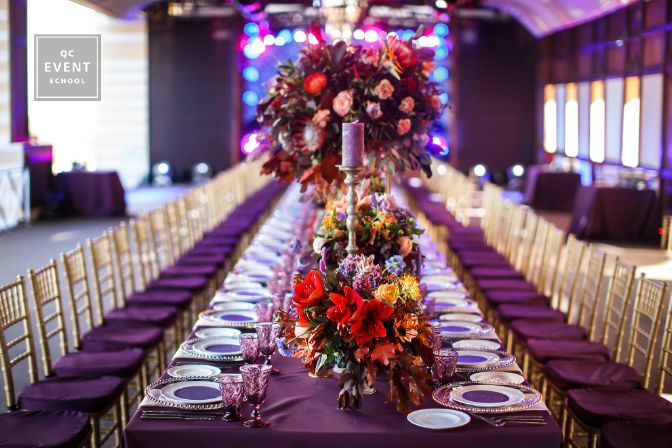
General Tips, Your Event Career
Should YOU Start an Event Planning Business?
So, you’re thinking of a career as an event planner. That’s great! Now the question is: should you start an event planning business? More to the point – is event planning the right career for you in the first place?
Luckily, you’ve come to the right place.
This article will teach you everything you need to know about the professional event and wedding planning industry… As well as what to expect when starting (and running) your own company. This way, you can make the best decision possible – whether that’s diving in head first and starting your own event planning business, or simply becoming an event planner in general.
So, let’s get started!
Is Event Planning Hard?
The first thing you need to know is that event planning isn’t easy. It’s a lot of work – and it takes a certain type of person to be able to handle the stress that comes with the job.
That being said, it’s also an incredibly rewarding career! If you’re the type of person who loves a challenge, enjoys working with people, and gets satisfaction from making other people happy, then event planning might just be the perfect fit for you.
What Does an Event Planner Do?
An event planner is responsible for everything that goes into making an event run smoothly, from start to finish. This includes everything from booking venues and vendors, to managing budgets and timelines, to dealing with last-minute crises… And everything in-between.
In short, an event planner is a project manager, a people-person, and a problem-solver all rolled into one. If that sounds like something you’re interested in, then keep reading!
What Skills Does Every Good Event Planner Need?
To be a successful event planner, you’ll need to have a good mix of both hard skills and soft skills.
Hard Skills
On the “hard” side, you should be organized, detail-oriented, and able to handle multiple tasks simultaneously without losing your cool. You should also be proficient in basic computer programs like Microsoft Word and Excel.
Soft Skills
But being an event planner is about more than just being good with numbers and logistics. You also need to be a “people person”, with great communication and customer service skills. After all, a big part of your job will be dealing with clients – often during high-stress situations!
Learn even more about whether a career in event planning is right for you by clicking here!
What Are The Advantages of Being an Event Planner?
There are countless perks to being an event planning professional. That said, here are just a handful of the top reasons you’ll enjoy this career path…
- You get to be your own boss! As an event planner, you can either work for an existing company or start your very own (which we’ll talk more about shortly).
- You’re in control of your own destiny! If you want to work less (or more), all you have to do is say so.
- You get to travel! Many event planners have the opportunity to travel both domestically and internationally for work.
- You get paid to party! Okay, not literally. But as an event planner, you’ll often get to attend the events you’ve planned – and that can be a lot of fun!
- You get to meet all kinds of people! One of the best things about being an event planner is that you’ll meet all sorts of people from all walks of life.
- You get to make dreams come true! There’s nothing quite like seeing the look on a client’s face when they see their event come to life exactly as they’d imagined.
If any of these reasons resonate with you, then a career in event planning sounds like the perfect fit!
What Are The Disadvantages of Being an Event Planner?
Of course, no career is perfect – and being an event planner is no exception. Here are a few of the potential drawbacks you should keep in mind before making your decision:
- It’s a lot of work. And we mean a LOT. As we mentioned before, being an event planner is not easy. It takes a lot of time and effort to make sure every detail is taken care of – and that can be exhausting.
- It’s often a thankless job. While it’s true that you’ll sometimes get to attend the events you’ve planned, you’re not there to have fun. You’re working – which means long hours on your feet, dealing with stressful situations, and often going unnoticed.
- You need thick skin. If you’re easily offended or tend to take things personally, being an event planner is probably not the right fit for you.
- You have to be “on” all the time. Even when you’re not working, you need to be ready and willing to talk about your business. That can be tough, especially if you’re an introvert! (That said, introverts can – and do – absolutely have happy, thriving careers in the event planning industry!)
- Event planning isn’t a 9-to-5 job. If you’re looking for a traditional job with set hours, this is not it. As an event planner, you’ll often have to work nights and weekends. Furthermore, as the day of the event draws closer, you may choose to be on call 24/7 – just in case something goes wrong.
Keep in mind, though, that if you’re passionate about what you do, none of these disadvantages will feel like a big deal. In fact, they’ll probably seem like small sacrifices to make in order to have the career of your dreams!
How Successful is an Event Planner?
This is a tough question to answer, as “success” means different things to different people. That said, most event planners would probably say that they are successful if they’re able to make a good living doing what they love. And the good news is that it’s completely possible to make a very comfortable living as an event planner!
In fact, the average salary for an event planner in the United States ranges from $34,000 USD to $74,000 USD per year! In Canada, that figure is between $39,000 CAD and $67,000 CAD annually. If you reside in the United Kingdom, you can be looking at a yearly income anywhere between £18,000 GBP and £43,000 GBP. And event planners in Australia tend to make anywhere from $46,000 AUD to $84,000 AUD per year.
Other Factors That Can Impact Your Income
Of course, your actual earnings will depend on a multitude of factors, such as your:
- Level of experience
- Location
- Whether you work for yourself or someone else
- The local competition
- Your professional qualifications (i.e. whether or not you have an accredited certification/designation)
- The event planning services you offer
- How you’ve set your service rates
- Your marketing strategies and efforts
- And more.
However, no matter how you slice it, you have the potential to earn a pretty hefty salary as an event planning professional!
Should You Start an Event Planning Business?
Alright, now that you know a little bit more about what goes into being a professional event planner, it’s time to look at the business side of things. Namely, should you start your own event planning business in the first place?
Let’s see, shall we?
How to Start an Event Planning Business with No Experience
If you’re thinking about starting your own event planning business but have no experience in the industry, don’t worry! You can absolutely do it. In fact, many event planners start their careers without any prior experience.
Of course, it will take a little bit of extra effort on your part to get things off the ground – but that’s true of any new business venture. The most important thing is that you’re willing to put in the work and learn as you go. Here are a few tips to help you get started:
Tip #1: Do Your Research
First and foremost, educate yourself about the event planning industry. Read books, listen to podcasts, and scour the internet for information. It’s also a good idea to attend events (both as a guest and as a vendor) so you can get a feel for what goes into planning them.
Tip #2: Build a Portfolio
As you start learning about event planning, start documenting your findings. Create a blog, write articles, make videos – whatever feels natural to you. Not only will this help solidify the information in your mind, but it will also give you something to show prospective clients when they’re considering hiring you.
Tip #3: Get Certified
Although it’s not required, becoming certified shows that you’re serious about your event planning business – and that you’re committed to providing the best possible service to your clients. In terms of professional certification training, you can find everything you need through QC Event School and our extensive list of self-paced, online courses!
Just to make it easier for you, here’s the full list of our current online wedding and event planning certification programs!
Tip #4: Marketing, Marketing, Marketing
Once you’ve got the basics down, it’s time to start marketing your event planning business. This can be done in a number of ways, such as through online advertising, PR campaigns, social media outreach, networking, and good old-fashioned word-of-mouth.
Tip #5: Start Small
When you’re first starting out, it’s usually best to take on small projects – like birthday parties or baby showers – before moving on to bigger events, such as weddings or corporate functions. Not only will this give you a chance to get your feet wet without feeling overwhelmed; it will also help build up your portfolio and attract more clients!
Pro Tip: We’ve written the ULTIMATE Guide on starting an event planning business from scratch, so make sure to check it out for even more awesome advice!
Legal Requirements for an Event Planning Business
Next, let’s take a look at the legal requirements you’ll need to take care of before you can start working with clients.
While the exact requirements will vary from country to country (and even from state to state in some cases), there are a few general things you’ll need to do in order to get your business up and running:
Choose a Business Structure
The first step is choosing the right business structure for your event planning company. This can be anything from a sole proprietorship to a limited liability company (LLC). Once you’ve decided on the best option for your business, you’ll need to register it with your local government.
Get a Business License
In order to operate legally, you’ll need to get a business license from your city or county. The application process is usually pretty straightforward, but it’s always a good idea to check with your local chamber of commerce or small business development center for more information.
Get Insurance
As an event planner, you’ll be working with a lot of different vendors and handling sensitive client information. Thus, you need to be properly insured. Look into getting general liability insurance, as well as errors and omissions insurance for your business.
Set up a Business Bank Account
Once you’ve taken care of the legalities, it’s time to set up a dedicated bank account for your event planning business. This will help you keep track of your finances and make it easier to do your taxes at the end of the year.
Naming Your Event Planning Business
Once you’ve got the basics down, it’ll be time to start thinking about what to name your event planning business.
This can be a tough decision, as there are a lot of factors to consider. For example, do you want something catchy or straightforward? Something unique or generic?
There’s no right or wrong answer here. Ultimately, it all comes down to what you want for your business. Just make sure you choose something you’re happy with, as it will be the first impression potential clients have of your company.
And don’t forget to get your business name registered, so that no one else can swoop in and use your business name themselves.
If you’ve never had to name a business before, this blog article will tell you everything you need to know to get started!
Branding Your Event Planning Business
After you’ve settled on a name, it’s time to start thinking about branding. This includes everything from your business logo to your company colors and tagline.
Your branding should reflect the type of events you want to be known for planning. For example, if you’re aiming to be a luxury event planner, then your branding should reflect that. On the other hand, if you’re more interested in planning fun and quirky events, then your branding can be a little more lighthearted.
There are endless possibilities when it comes to branding your event planning business – so have fun with it!
Equipment Needed for Event Planning Businesses
Now let’s take a look at some of the equipment you’ll need to get started in the event planning industry.
A Laptop or Computer
First and foremost, you’ll need a good computer and reliable internet access. This is important for everything from keeping track of your clients’ contact information to sending out invoices and marketing your business online. Moreover, you’ll need it to create and run your business website, along with your social media accounts.
A Printer
You’ll also need a printer (for printing contracts, flyers, etc.), as well as a digital camera (or high-quality smartphone) to take photos of your events if there’s not already a designated photographer. Speaking of printing things out, make sure you always have a ton of business cards on-hand! After all, you never know when someone will come up to you and ask about your business.
A Cellphone
A cellphone is also a requirement for any event planner. After all, you need to be able to be reached by your clients at all hours of the day – just in case something comes up. Not to mention, you can use your phone to easily conduct a virtual client consultation if an in-person one isn’t an option.
Event Planning Software
While not required, event planning software can definitely make your life a lot easier. There are a variety of different software programs available, each with their own set of features.
For example, some software programs allow you to manage your clients’ contact information, as well as keep track of important dates and deadlines. Other programs let you create custom proposals and contracts, as well as provide a platform for marketing your business online and accepting payments from clients. Plus, there are also a wide variety of software programs that can help you manage/run your business and keep track of your finances.
The bottom line is that there’s a lot of great event planning software out there. So, do some research and find the one that’s right for you and your business.
Other than the items mentioned in the list above, you really don’t need much in terms of equipment – which is one of the great things about starting an event planning business!
Your Business Plan
In order to start an event planning business, you’ll also need a business plan. This is essentially a document that outlines your event planning business goals, as well as how you plan on achieving them. Your business plan should include everything from your company overview and target market to your marketing strategy and financial projections.
Event Planning Business Plan Sample
Never written a business plan before? No worries! Let’s take a look at the pertinent information your business plan should contain. This way, you’ll have the building blocks ready to help you get started.
Step 1: Write Your Executive Summary
The executive summary is a brief overview of your event planning business plan. (Think of it as the cliff notes version!) Here, you’ll want to include your company name, along with your mission statement and a brief description of what your business does. You’ll also want to mention your target market and any unique selling points (USPs) that make your business stand out from the competition.
Step 2: Write Your Company Description
In the company description section, you’ll provide more information about your event planning business. This is where you’ll talk about your company history (if applicable), as well as any relevant industry experience your team has. You should also include information about your company structure, such as how many employees you have and what their roles are.
Lastly, this is also the section where you’ll want to talk about your business location(s) and any expansion plans you have for the future.
Step #3: List Your Products and Services
In the products and services section, you’ll want to give a detailed overview of the event planning services you offer. Be sure to include information on any unique or customizable services you offer, as well as any add-on services that might be of interest to potential clients.
This is also the section where you’ll want to talk about your pricing model. For instance, will you charge a flat fee or an hourly rate? And, if you offer discounts for certain services, be sure to mention that here as well.
Step #4: Outline Your Plan for Marketing and Sales
In the marketing and sales section, you’ll want to outline your event planning business’s marketing strategy. This should include information on how you plan on promoting your business, as well as any sales initiatives you have in place.
You’ll also want to talk about your event planning company’s branding and what makes it unique. What is your company’s identity? How will that be reflected in your marketing materials?
Lastly, this is also the section where you’ll want to talk about your website and social media presence. Be sure to include information on any SEO or PPC campaigns you’re running, as well as which social media platforms you’re active on.
Step #5: Lay Out Your Financial Projections
In the financial projections section, you’ll want to provide an overview of your event planning business’s financials. This should include your start-up costs, as well as your projected revenue and expenses for the next three to five years.
You’ll also want to talk about your event planning company’s funding needs and how you plan on raising capital. If you already have investors lined up, be sure to mention that here as well.
And lastly, this is also the section where you’ll want to provide information on your event planning business’s exit strategy. What are your long-term goals for the company? And how do you plan on achieving them?
Step #6: Have an Exit Strategy
The exit strategy is the final section of your event planning business plan. In this section, you’ll want to provide an overview of your event planning company’s long-term goals. This should include information on how you plan on growing your business, as well as any eventual plans you have for selling it or taking it public.
You should also include information on your target market and how you plan on reaching them. What are your marketing and sales initiatives? How do you plan on scaling your business?
Lastly, this is also the section where you’ll want to talk about your management team and their experience in the event planning industry. Who are the key members of your team? What makes them qualified to help grow your business?
By following the steps outlined above, you’ll be well on your way to starting and running a successful event planning company. But remember, this is just a guide – it’s up to YOU to put in the hard work and make your event planning business a success!
Starting an Event Planning Business Checklist
From there, it’ll be time to actually get your event planning business started! Use this checklist to make sure you have everything you need to get up and running:
🔲Complete your professional event planner certification training.
🔲Choose a niche or specialty for your event planning business.
🔲Name your business.
🔲Develop a strong brand identity for your company.
🔲Create a detailed business plan.
🔲Secure funding for your event planning business.
🔲Develop your professional portfolio.
🔲Build a website and create social media accounts.
🔲Promote your event planning business through marketing and sales initiatives.
🔲Grow your company by expanding into new markets, networking, and adding new products and services.
🔲Stay up-to-date on current news and trends via research, continued education, etc.
By following the steps outlined in this article, you’ll be well on your way to starting and running a successful event planning company of your own!
How Do Event Planning Companies Get Clients?
Now that you have a better understanding of what goes into starting an event planning business, you might be wondering how event planning companies actually get clients. After all, without clients, your business won’t be able to survive for very long.
There are a number of ways to go about getting clients for your event planning business. The most important thing is to make sure that you’re marketing and promoting your business in the right way. Here are a few tips to get you started:
- Make sure your website is always up-to-date and easy to navigate. Include information on your services, pricing, and contact information.
- Create social media accounts on all the major platforms (e.g. Facebook, Twitter, Instagram) and post regular content that showcases your event planning skills.
- Attend industry events and networking functions. This is a great way to meet potential clients, as well as network and build relationships with other event professionals.
- Get involved with local charities and non-profit organizations. Many of these types of organizations are always in need of volunteers to help plan their events.
- Run targeted advertising campaigns (e.g. SEO, PPC, social media ads) to reach your target market where they’re already spending time online.
With the help of these tips, you should be able to start getting clients for your event planning business in no time! Just remember to stay focused and consistent with your marketing efforts. After all, it takes time and effort to build a successful business.
But if you put in the work, the rewards will be well worth it!
Event Planning Startup Kit
Before we wrap things up, here are some additional blog articles that will help you better understand how to start up your very own event planning company and get your career off the ground:
- How to Start an Event Planning Business from Scratch
- How to Define The Objectives for Your Event Planning Company
- 11 Niche Ideas for an Event Planning Business
- How to Get Clients as an Event Planner
- How to Start an Event Planning Business While Still in School
- Your Event Planning Career: 5 Vendors to Network With
- Event Planner Jobs: How to Network Like a Pro
- Event Planner Salary: 4 Tips for Pricing Your Services
- 4 Reasons Why You Should Start an Event Planner Business NOW!
- How to Start an Event Planning Business on a Budget
- How a Bad Business Name Can Hurt Your Event Planner Career
So, Should You Start an Event Planning Business?
Ultimately, only you can answer this question. But we hope that after reading this article, you have a better understanding of the event planning industry and what it takes to start your own event planning company (regardless of whether you have any experience in this or not).
If you’re still on the fence about whether or not starting an event planning business is right for you, consider these questions:
- Do you have a passion for planning events?
- Are you willing to put in the time and effort required to build a successful business?
- Do you have experience working in the event planning industry?
- If not, are you willing to get properly trained and gain that experience?
- Do you have a strong understanding of the business side of things?
- If not, are you willing to learn?
If you answered “yes” to all of these questions, then there’s a good chance that starting an event planning business is right for you!
So, what are you waiting for? It’s time to get out there and start planning some amazing events!








Yes, you are right, and I agree with you. Event planning is a creative and exciting business to start. It is also one of the fastest-growing industries. And as more and more people are getting involved in this industry, there is a need for more event planners to step up and create their businesses. Thank you for sharing this blog with us. It is very detailed and informative. I am looking forward to read more such blogs in the future.